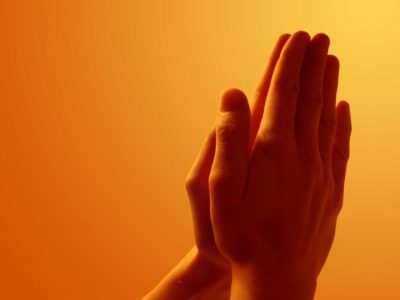Micah Rosegrant, a freelance artist, “wordsworker” and part-time senior at Boston University in the College of Fine Arts, guided students through an hour of connecting wellness, art and spirituality during “Divine Love is Our Birthright: a workshop in transfuturist prayer” Friday.

The event, named for art created by Féi Hernandez and SA Smythe, was hosted by BU’s Queer Activist Collective, also known as Q, the Asian Student Union and the Filipino Student Association, Rosegrant said at the event.
The workshop also precedes International Transgender Day of Visibility Wednesday, an annual celebration and recognition of transgender and nonbinary individuals, Rosegrant said. However, they added spirituality does not limit itself to certain people.
“There’s a reason why I want to bring this practice to more people and have it not be exclusively attached to any sort of identity, religious or sexual or gender, or otherwise,” they said in an interview.
At the workshop, Rosegrant took participants through mindful journaling and “trans affirmative spirituality.” In an interview, they said collective engagement can help foster inclusive communities.
“It’s really about creating community spaces,” they said, “and having us engage in verbs together that more powerfully harness the wonders that can sort of happen when we make intentional gatherings to be vulnerable with ourselves, and potentially with each other.”
In an email, organizers wrote that it is important to provide transgender and gender-nonconforming individuals with uplifting community.
“We especially wanted to feature Micah because it’s important that TGNC artists and creators are being given the recognition they deserve and the opportunity to share their wonderful work with the community,” organizers wrote. “This is something us folks at Q really try to prioritize, especially given that many LGBTQ+ spaces have historically not been very inclusive or embracing of people who are non-cisgender and/or people of color.”
Ally Ang, a queer, nonbinary, Indonesian American poet, wrote in an email they attended the event as a friend of Rosegrant’s. They wrote the workshop focused on reflection and, for them, was a moment to focus on wellness in a safe place and reflect on recent tragedies.
“I was also looking for a space to commune (albeit virtually) with other queer and trans people as I moved through my grief around the recent shooting in Atlanta and countless other tragedies,” Ang wrote, “and I thought this would be a good opportunity to do so.”
Rosegrant took the group through mindfulness exercises, including creating “altars”— whether physical or non-physical realms such as poetry or spoken word — where ideas and characteristics represent aspects of “the world we inherit and the world we pass on,” they said at the event.
In an interview, they said altars have significance in their own life.
“In my personal histories, altars have been a space for us to create offerings to our family and to the spiritual plane we want to honor in our homes,” Rosegrant said, “and so in applying that same logic to the more abstract space of spirit, of poetry, of creating, these holistic practices I speak of, I turn to alters as a space for that to be true.”
They said in an interview they hope the workshop helps support queer and trans individuals in the BU community, filling a need for more of those supportive spaces.
“There’s not enough spaces where we get to really tune in to our presence, tune into the histories we come from, and collectively imagine the futures we want to build and inhabit together,” they said. “My main goal was to really create an atmosphere and environment … in us just gathering and generating life-affirming and life-fulfilling poetry or love of language together.”
Ang wrote that community is important in the LGBTQ+ community, especially as visibility for trans individuals can be a “double edged sword” because of systemic violence against trans folks, particularly Black trans women.
Last summer, the National Center for Transgender Equality wrote that the violence against Black transgender women is an “epidemic,” and cited a study the organization did that revealed 47% of Black transgender individuals who responded were harassed verbally or physically, and or “denied equal treatment” because of their identity.
Ang wrote that creating a safe space like this event for queer and trans individuals to gather is essential for their well-being and survival.
“Having space to write, dream, reflect, and just be with other queer and trans people is so vital for our healing and survival,” they said. “Having a safe space to see and be seen by each other is a welcome respite from the transphobic society we live in, where we are either rendered invisible or dangerously hyper-visible.”
Rosegrant themself turned to the arts and altars as a way to honor not only their direct ancestors, but also to the queer and trans people who came before them, they said in an interview.
“We are communities of people who across time have been persecuted by different ways and in so many different spaces,” Rosegrant said. “As a living and breathing queer trans artist today, I turned to this imaginative work as a way to embrace the amounts of life we come from.”























































































































